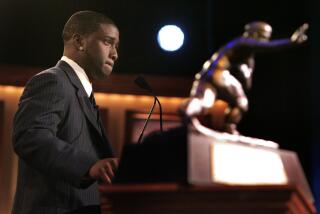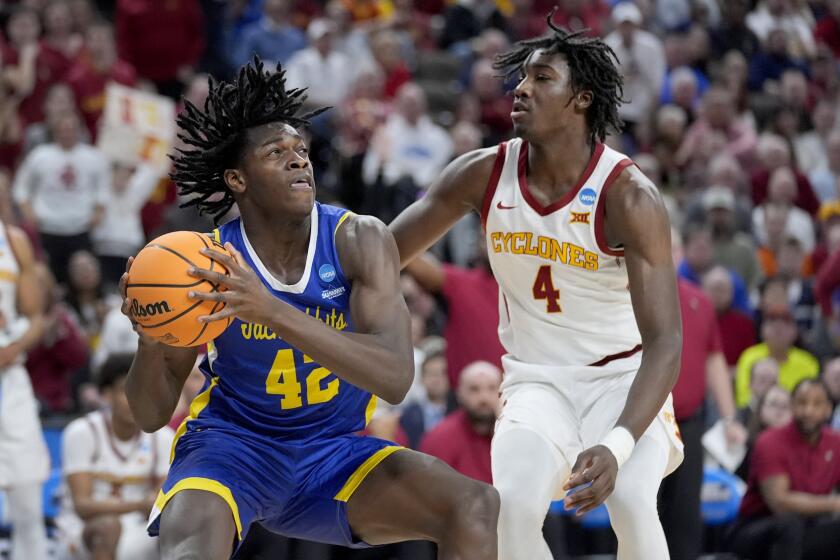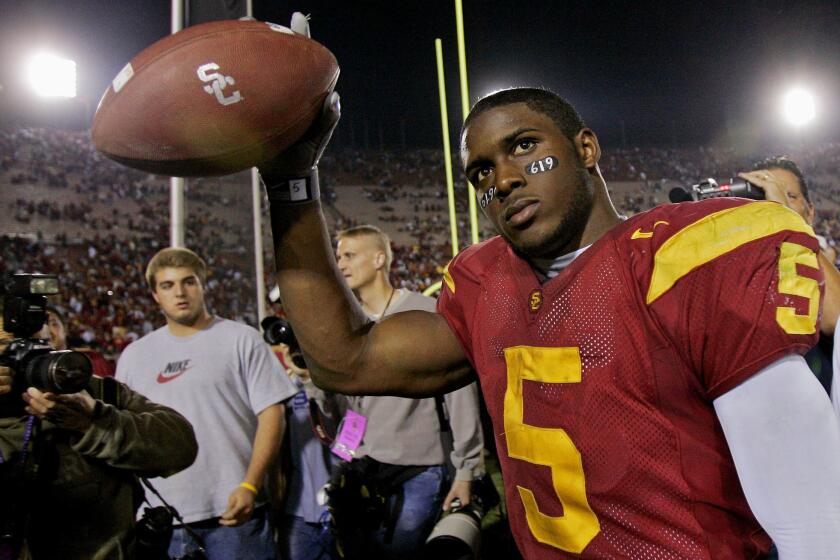Salary Doesn’t Pay in WNBA
Shaquille O’Neal, the highest-paid player in the NBA, makes roughly a $17.4-million salary this season.
Cynthia Cooper, the highest-paid player in the NBA’s subsidiary, the WNBA, makes $75,798, which is her base salary and doesn’t include endorsement income.
No one in the WNBA is suggesting its players be paid anything like players employed by their parent company, but many in the 4-year-old league think the current 5% to 10% yearly compensation increases aren’t commensurate with revenue they believe the league is earning.
The WNBA says it’s losing money.
But the league, which has averaged 10,000 in attendance the last two years, won’t open its books entirely for examination by the Women’s National Basketball Players Assn., the players’ union.
So that issue simmers as the league begins its fourth season today, with New York and Houston tipping off in Houston on NBC.
Some say the league’s corporate sponsorship income has swelled from $21 million in 1997 to more than $40 million this year.
Yet about 50 WNBA players made $25,000 or less last season. At least 12 make more than $70,000 for the 32-game, 2 1/2-month season.
There are signs the WNBA is beginning to wear thin with its marquee players, in a sport where athletes can earn triple their WNBA salaries in European leagues. Among the indications:
* The league has still not signed four-time Olympian Teresa Edwards, regarded by many as the world’s greatest player. Show me the money, she says.
* Isabelle Fijalkowski, leading rebounder and scorer for the WNBA’s Cleveland Rockers in 1998, refused to accept a $70,000 contract offer and remained in Europe last year.
* Cindy Brown, No. 2 rebounder in the WNBA in 1998, quit the league a year ago and returned to Europe to play.
* Jennifer Azzi, offered only a slight raise over the $44,000 she made last year at Detroit, said she’d sit out the 2000 season, but changed her mind when offered a trade to Utah.
* Andrea Congreaves of the Orlando Miracle, outraged at an offer of $32,500 by the league (players are paid by the WNBA, not by their teams), also left for Europe with this parting shot: “I wouldn’t sign now if their offer was six digits.”
WNBA players knew what was coming down salary-wise when they signed a collective bargaining agreement with the league before last season. It extends through the 2002 season, but both parties can reopen negotiations after the 2001 season.
“If things don’t change, I think fewer players are going to be interested in playing in the WNBA,” union chief Pam Wheeler said.
“Some look at these small salary increases and figure they’d have to play 50 years to make what they feel their worth.”
Example A: Brandy Reed, the talented forward with the Phoenix Mercury. She was offered $35,000 for this season after earning $30,000 in 1999. After first threatening to jump to Europe, she reconsidered and signed.
Want more names? How about this one: Lisa Leslie.
The 6-foot-5 Spark center’s WNBA player salary is $72,188. Her NBA personal services deal and other endorsement deals push her income to more than $1 million.
She’s also in the last year of her WNBA contract.
Her agent, Bruce Binko, says Europe could be in her future if the WNBA compensation isn’t enhanced.
“Lisa is going to consider all options after this season,” Binko said.
“If you want to play pro ball in the U.S., the WNBA is the only game in town. There is no free agency. They can pay you anything they want.
“If she decides she wants to go to Europe, I’ll find out who the highest paid player is over there and then try to make Lisa the highest paid.”
Agent Erica McKeon, who with Bruce Levy in New York places U.S. women in European, South American and Asian leagues, sees acrimony ahead for the WNBA and its players.
“The players are still hearing the league tell them ‘We’re growing, we’re young, we can’t afford to pay you more,’ and our players tell us: ‘OK, this is four years now they’re telling me this.’ ”
WNBA president Val Ackerman, in a Friday interview, repeated what she has told players in recent years. “We are losing money, but I won’t tell you how much,” she said.
“There are no rights fees with our TV partners [NBC, ESPN, Lifetime], and the league pays all player salaries and operational costs. All this is based on the premise that a [profitable] business will grow out of this. Most jobs in America today have pay increases of less than 5%.
“Our veteran’s minimum went from $30,000 [last year] to $32,500 this year, and it goes to $35,000 this year. It 2002 it will be $40,000. So we’re getting there.
“But please, don’t compare our compensation to that of a Wall Street law firm, the movie business or the NBA. We should be compared to what we are, a young, growing women’s sports league.”
More to Read
Get our high school sports newsletter
Prep Rally is devoted to the SoCal high school sports experience, bringing you scores, stories and a behind-the-scenes look at what makes prep sports so popular.
You may occasionally receive promotional content from the Los Angeles Times.






